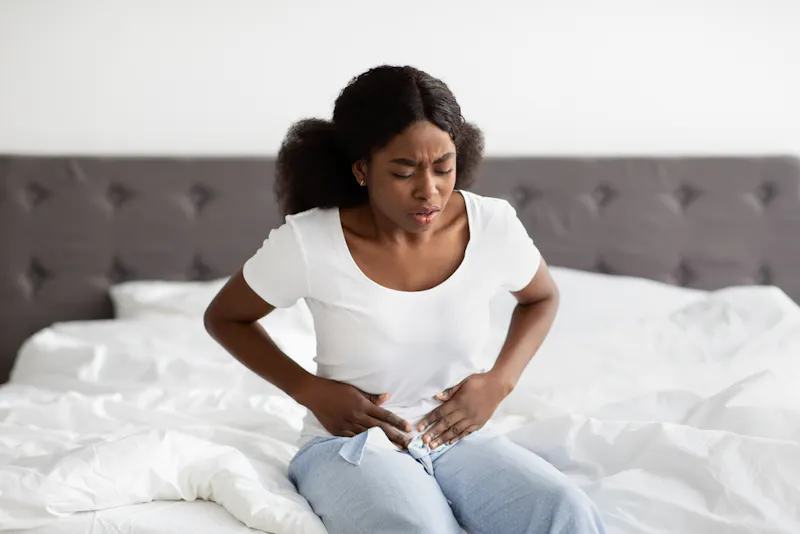Endometriosis
What's covered?



Endometriosis is a long-term disease affecting 1 in 10 women of reproductive age in the UK. It’s the second most common gynaecological condition after fibroids (non-cancerous growths in or around your womb). Because there are many symptoms of endometriosis, it can take between 7 to 12 years to get a clinical diagnosis. The exact cause of endometriosis is unknown, but it can significantly affect your physical and mental health. This is why treatment focuses on managing symptoms to improve your quality of life.
What is endometriosis?
Endometriosis is a disease where tissue like your womb lining (endometrium) grows in other areas of your body — like your ovaries and bowel. This tissue can become inflamed and form growths called implants or lesions.
Endometriosis can affect many parts of your body, including your:
- vagina
- bottom (rectum)
- intestines
- bladder
- diaphragm — a muscle below your lungs
What are the symptoms of endometriosis?
Endometriosis symptoms can differ in severity and frequency from woman to woman. It’s also important to know that pain doesn’t only occur during your period.
The most common symptoms of endometriosis include:
- painful periods
- pain during sex
- long-term pelvic pain
- painful bowel movements
- painful pee or blood in your pee
- PMS symptoms with or without abnormal bleeding and pain
- chronic fatigue syndrome (CFS)
- depression and anxiety — as a result of the effect it has on your quality of life
- infertility in up to 50% of women
- back, legs, and chest pain
- nausea and bloating
You should speak to your GP if you have any of these symptoms.
The severity of endometriosis is based on a 4-stage scale:
- Stage 1: minimal endometriosis — small implants (the growths forming from inflamed tissue) are present in your pelvis or abdomen lining.
- Stage 2: mild endometriosis — implants are slightly larger and deeper and can form scar tissue.
- Stage 3: moderate endometriosis — there are many deep implants, and you might have a thick band of scar tissue, also known as an adhesion. You might also have small cysts on your ovaries.
- Stage 4: severe endometriosis — you have several deep implants and adhesions, as well as larger cysts on your ovaries.
It’s important to know that you might still experience severe pain with minimal endometriosis.
What causes endometriosis?
The exact cause of endometriosis isn’t known, but it’s likely a combination of different factors.
Many theories try to pinpoint its causes, including:
- retrograde menstruation — when menstrual blood flows back into your pelvis instead of leaving your vagina during your period
- cellular metaplasia — when your cells change from one form to another, leading to endometrial-like cells growing outside your uterus
- problems with your immune system
- genetics — a family history of the disease might increase your risk of developing it
- endometrium cells in your bloodstream or the tubes and glands (lymphatic system) that forms part of your immune system
What does an endometriosis diagnosis involve?
If you’re worried you have endometriosis and it’s affecting your life, it’s essential to see your GP.
There’s no single test for endometriosis. An endometriosis diagnosis typically involves talking to your doctor about your symptoms, so it might be useful to write them down beforehand. They might also examine your tummy and vagina.
Your GP might refer you to a specialist (a gynaecologist) for further tests — like an ultrasound scan or laparoscopy. A laparoscopy is where a thin tube is passed through a small cut in your tummy so your surgeon can spot any endometriosis tissue.
How does endometriosis affect your ability to get pregnant?
Difficulty getting pregnant or not being able to get pregnant at all (infertility) is one of the main complications of endometriosis.
Endometriosis doesn’t directly cause infertility. But researchers have some theories about how endometriosis might affect your ability to get pregnant naturally, including:
- scarring or tissue from endometriosis can make it difficult for the egg to travel from the fallopian tubes to the uterus
- inflammation produces chemicals called cytokines — which can make it difficult for sperm to fertilise your egg cells
- tissue on your ovaries can make it difficult for eggs to be released
You can get valuable insights into your fertility by using a fertility insights blood test.
How will endometriosis affect your pregnancy?
If you conceive, your pregnancy should be normal. In fact, pregnancy and the absence of your periods might temporarily relieve endometriosis pain.
Increased progesterone levels during pregnancy might even cause temporary pain relief and cause implants to shrink. But, symptoms might return when your period is back to normal after birth.
Pregnancy will differ from person to person — depending on your body’s hormone production and response to pregnancy.
Is there a cure for endometriosis?
Unfortunately, there’s currently no cure for endometriosis. But some treatments can help reduce your symptoms, slow the growth of endometrial tissue, and improve fertility.
The most common endometriosis treatments include:
- painkillers — like ibuprofen and paracetamol
- hormonal contraceptives — like the combined pill, the contraceptive patch, an intrauterine system (IUS), and gonadotrophin-releasing hormone (GnRH) analogues
In severe cases, you might have surgery to cut away endometriosis tissue that’s causing you pain. Or, you might have surgery to remove your womb (hysterectomy).
Your treatment depends on how endometriosis symptoms affect you. Sometimes your GP might suggest not starting treatment immediately to see if your symptoms improve on their own.
Living with endometriosis
Endometriosis can be difficult to live with, both physically and emotionally. But it’s important to remember you’re not alone and can get help.
For example, a support group like Endometriosis UK might be a useful source for more information and advice.
And if you feel comfortable, friends and family members can be a good source of support and comfort if you’re struggling and want to discuss it.
You might also benefit from a counselling service to discuss how endometriosis affects you. Trained psychologists and counsellors can help you cope with feelings and chronic pain linked to this disease.
Fadhlaoui, A., Bouquet de la Jolinière, J., & Feki, A. (2014). Endometriosis and infertility: how and when to treat?. Frontiers in surgery, 1, 24
Marcoux S., Maheux R., Berube S (1987). Laparoscopic surgery in infertile women with minimal or mild endometriosis. Canadian Collaborative Group on Endometriosis. New England Journal of Medicine; 337: 217-22.
Senapati, S., & Barnhart, K. (2011). Managing endometriosis associated infertility. Clinical obstetrics and gynecology, 54(4), 720.
Tanbo, T., & Fedorcsak, P. (2017). Endometriosis‐associated infertility: aspects of pathophysiological mechanisms and treatment options. Acta obstetricia et gynecologica Scandinavica, 96(6), 659-667.
National Health Services (2020). Infertility: treatment. Retrieved 2 September 2022 from https://www.nhs.uk/conditions/infertility/treatment/.
National Health Service (2019). Endometriosis. Retrieved 2 September 2022 from https://www.nhs.uk/conditions/endometriosis/.
Royal College of Nursing. Endometriosis fact sheet. Retrieved 2 September 2022 from https://www.rcn.org.uk/-/media/royal-college-of-nursing/documents/publications/2015/march/pub-004777.pdf.
World Health Organisation (2021). Endometriosis. Retrieved 2 September 2022 from https://www.who.int/news-room/fact-sheets/detail/endometriosis.